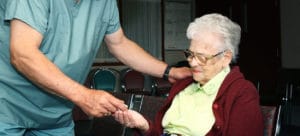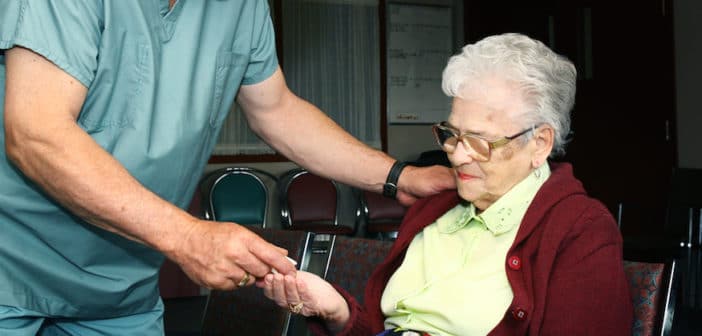 (This post was originally published in June 2014.)
(This post was originally published in June 2014.)
USA Today recently published an article on a national disgrace: the fact that doctors and Big Pharma that are destroying the lives of seniors in America by prescribing—and then continuing to prescribe—opiates at a feverish pace.
As Dr. Mel Pohl of the Las Vegas Recovery Center points out in the article’s online video, the US has four percent of the world’s population but 80% of its opioid users. And why’s that? Because America just keeps taking out its prescription pad. The video features a number of heartbreaking stories—including that of 67-year-old Betty Van Amburgh, who was prescribed “a constant changing of medications” for 20 years and ended up addicted. Van Amburgh—who entered rehab with a shopping bag full of prescribed fentanyl, hydrocodone, and Xanax—was nearly unconscious, but still in pain.
This medical system is rendering our parents comatose, and no one’s taking responsibility because there’s just so much money to be made from pain.
And it fucking breaks my heart.
I visited my mother a few weeks ago. It was all the same: The bedroom smelling of urine; the nest of a bed, the tray of pills and white tablets scattered everywhere. I could grab one so easily. I hear they’re—Oh, I hear they’re delicious.
When my brothers and I swam in Lake Michigan as kids, Mom would stand on the hot sand in her orange polka-dot bikini, hands on hips, her eyes determinedly scanning the shoreline for her children’s bobbing heads. Mom knew the lake had an insidious undertow, and she was damned if it’d get us.
She got her PhD at the University of Chicago and for decades lectured at the Art Institute on Degas and Gauguin. She wouldn’t leave a bad marriage and chose to live with the pain. No, she chose to medicate the pain. So vodka entered the picture.
But now, like so many seniors, she lives in a daze of opioids—pain pills she cannot do without even though they don’t seem to alleviate the pain. Dr. Pohl wouldn’t be surprised. He says, “The real problems with these drugs is that they stop working effectively. More than 70% of the patients that are on them long-term are not getting the benefits they do when they first start them.”
Something’s got to be figured out, and soon. Overdose deaths among the 55+ crowd tripled from 1999-2010. According to the CDC, 75% of those deaths involved opioids.
I understand why doctors keep writing the prescriptions. As David Oslin, an addiction specialist and professor at the University of Pennsylvania School of Medicine, says, “People don’t want to take away a 70-year-old’s medications.” Once something’s been prescribed, it’s tough to cut the supply off. (And doesn’t Big Pharma goddamn know it.) Doctors don’t have another answer when they’re looking at patients who are already hooked.
Maybe this USA Today article will help people realize the gravity of this situation. Alas, many medical professionals still seem not to get it. The Johns Hopkins Health Alerts Website has the temerity to state that, “A person who takes pain medication for a legitimate ailment or injury has a slim chance of developing an addiction. The risk increases when opioids are given to someone who has a personal or family history of addiction or has a psychological disorder.”
My mother, like so many, was introduced to opiates in the hospital. She was in for cirrhosis. She’d also fallen and hurt her back. You’d think, given the obvious indications of alcohol abuse and her age, they might’ve prescribed her something else. But Mom was so sick; they thought she’d die so soon. And for us, it was good to see her out of pain.
Now it’s years later. She’s in more pain than ever, and she’s also far more remote than alcoholism alone ever rendered her. We’ve tried tough love, Alanon, interventions. She has a caregiver but refuses detox, rehab. In front of the doctor, my mom tries to become an articulate woman again. The doctor treats her rambling comments with great respect; he’s a kind man. He gives her the pills.
It’s happening all over the country. Drug use is surging amongst baby boomers. And many seniors tend to view Western medicine with a lot of faith. Betty Van Amburgh did, and ended up on that endless cocktail of medications that didn’t kill her pain but did extinguish her will to live. Post-rehab, she takes only Tylenol, and says it works.
And in my mother’s apartment I keep thinking about those scattered pills, wondering, Why can’t I get fucked up?
But I can’t. Instead I just keep my eyes on her frail form as the undertow relentlessly pulls her away. I cannot drag her to safety. I lean against the doorway and begin to cry, thinking how I cannot bear to lose my smart, funny, loving mother. It’s a silly thing to think, because I already have.
Sponsored DISCLAIMER: This is a paid advertisement for California Behavioral Health, LLC, a CA licensed substance abuse treatment provider and not a service provided by The Fix. Calls to this number are answered by CBH, free and without obligation to the consumer. No one who answers the call receives a fee based upon the consumer’s choice to enter treatment. For additional info on other treatment providers and options visit www.samhsa.gov.




